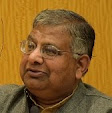Prolog (Contd)
I take a shower and we take a quick lunch. My nephew has taken the day off to accompany me to visit the British Museum in which I have my personal interest to learn about me and the country of my origin. I think every young person should be interested in finding their identity, but such luxury is not easily procured. We take train and reach the Museum about 1 PM. It's a massive place, buildings are again constructed in some arbitrary way around a colossal courtyard, the entrances to the buildings appear disconnected. The British culture does like the maze style discoveries. Various foreign groups were being escorted by guides, which is a good profession to help find your way among the strange array of numbered buildings. We arrive at the South Asia section and I was pleased with the display. There were exquisite carvings, beautifully made metal and ivory objects, broken religious artifacts from the temple walls and some complete stone structures completely reassembled on site. I wonder why people take time to lift items from another country. I marvel at the beauty and the grandeur of the display. I have told my children when they were small that we could be genetically artistic in nature. I look at my hands and don't think I would have patience to create any of the objects I see in display. Indians think art is a God's gift. I am curious why God stopped giving gifts.
Here I see objects from my area in India, the Buddhist remnants, old scripted palm leaf drawings, beautiful hard wood door panels, spears, axes, and in that shelf some prehistoric artifacts. I learn about my history, so I am in England. Time is limited, museum closes at 5 PM.
We walk to Covent Garden nearby to wait for another nephew of mine who works as an officer in a Bank. Because of his responsibility in work, he couldn't take off time and can only see us after work. His father is a younger brother to me and has been sick with a traumatic head injury for a couple of years now. My nephew takes care of him with diligence and patience through visits and resources. Sandeepan and I camp ourselves in a rustic looking food place and order some juice and sandwich. The second nephew Masoom shows up and we three feel at home in the company. Masoon is a poised and serious individual, I like his approach to life. We chat on life, society, people, India and England; we share views. I listen to them and enjoy their discourse. Masoom volunteers to escort me to the airport. I have to take the flight to Delhi in the night. We take the train and reach the airport at 9 PM. Now, my time with the maze towards the gate. This time I have security check, which becomes unusually swift. I proceed to the gate to take the flight at 10:30 PM.
I take a shower and we take a quick lunch. My nephew has taken the day off to accompany me to visit the British Museum in which I have my personal interest to learn about me and the country of my origin. I think every young person should be interested in finding their identity, but such luxury is not easily procured. We take train and reach the Museum about 1 PM. It's a massive place, buildings are again constructed in some arbitrary way around a colossal courtyard, the entrances to the buildings appear disconnected. The British culture does like the maze style discoveries. Various foreign groups were being escorted by guides, which is a good profession to help find your way among the strange array of numbered buildings. We arrive at the South Asia section and I was pleased with the display. There were exquisite carvings, beautifully made metal and ivory objects, broken religious artifacts from the temple walls and some complete stone structures completely reassembled on site. I wonder why people take time to lift items from another country. I marvel at the beauty and the grandeur of the display. I have told my children when they were small that we could be genetically artistic in nature. I look at my hands and don't think I would have patience to create any of the objects I see in display. Indians think art is a God's gift. I am curious why God stopped giving gifts.
Here I see objects from my area in India, the Buddhist remnants, old scripted palm leaf drawings, beautiful hard wood door panels, spears, axes, and in that shelf some prehistoric artifacts. I learn about my history, so I am in England. Time is limited, museum closes at 5 PM.
We walk to Covent Garden nearby to wait for another nephew of mine who works as an officer in a Bank. Because of his responsibility in work, he couldn't take off time and can only see us after work. His father is a younger brother to me and has been sick with a traumatic head injury for a couple of years now. My nephew takes care of him with diligence and patience through visits and resources. Sandeepan and I camp ourselves in a rustic looking food place and order some juice and sandwich. The second nephew Masoom shows up and we three feel at home in the company. Masoon is a poised and serious individual, I like his approach to life. We chat on life, society, people, India and England; we share views. I listen to them and enjoy their discourse. Masoom volunteers to escort me to the airport. I have to take the flight to Delhi in the night. We take the train and reach the airport at 9 PM. Now, my time with the maze towards the gate. This time I have security check, which becomes unusually swift. I proceed to the gate to take the flight at 10:30 PM.
